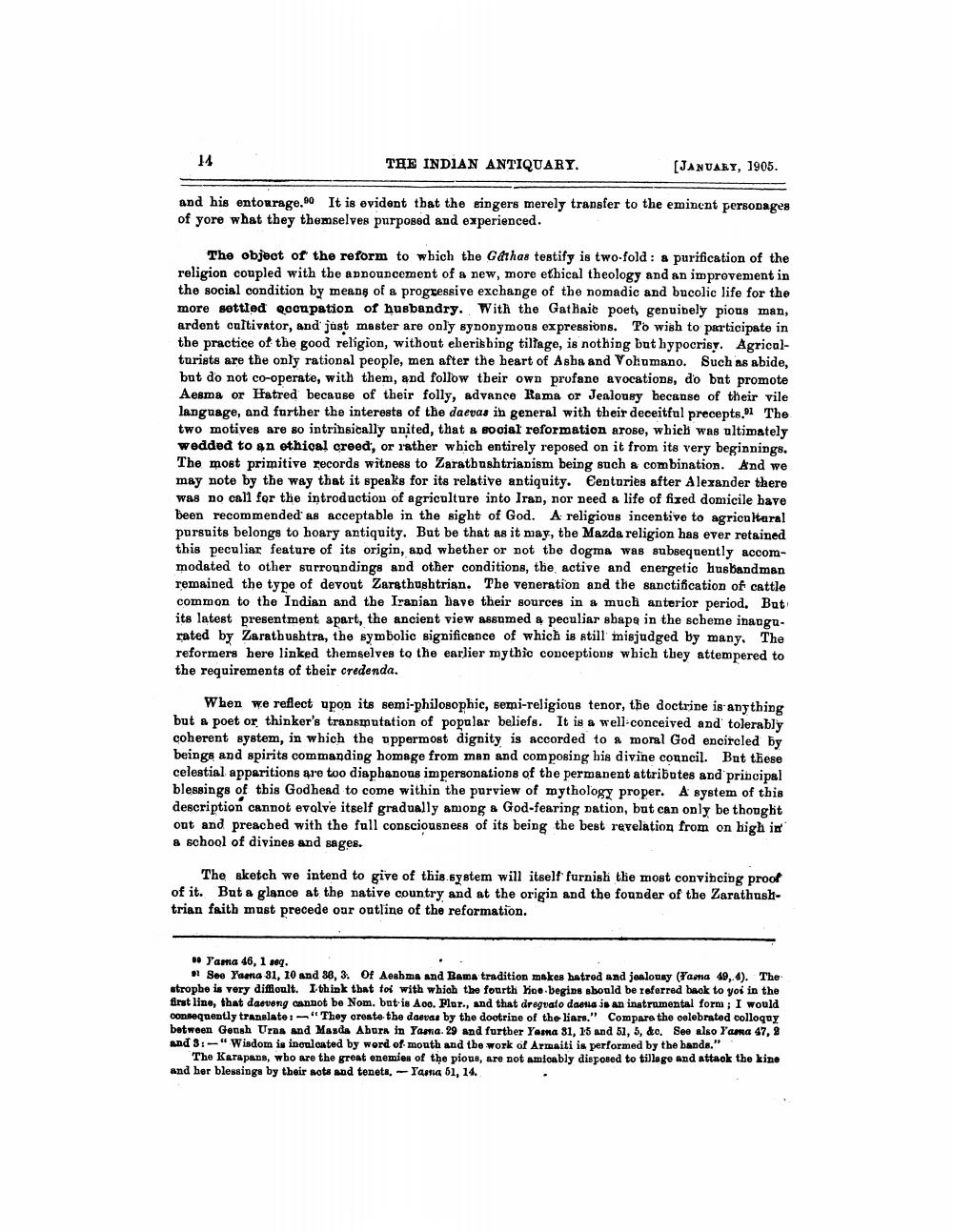________________
THE INDIAN ANTIQUARY.
(JANUARY, 1905.
and his entourage. It is evident that the singers merely transfer to the eminent personages of yore what they themselves purposed and experienced.
The object of the reform to which the Gathas testify is two-fold : & purification of the religion coupled with the announcement of a new, more ethical theology and an improvement in the social condition by means of a progressive exchange of the nomadic and bucolic life for the more settled decupation of husbandry. With the Gathaic poet, genuinely pious man, ardent cultivator, and just master are only synonymous expressions. Po wish to participate in the practice of the good religion, without eherishing tillage, is nothing but hypocrisy. Agricalturists are the only rational people, men after the beart of Asha and Vohumano. Such as abide, but do not co-operate, with them, and follow their own profane avocations, dio bat promote Aesma or Hatred because of their folly, advance Rama or Jealousy becanse of their vile language, and further the interests of the daevas in general with their deceitful precepts. The two motives are so intrinsically united, that a social reformation arose, which was ultimately wedded to an ethical creed, or rather which entirely reposed on it from its very beginnings. The most primitive records witness to Zarathushtrianism being such a combination. And we may note by the way that it speaks for its relative antiquity. Centuries after Alexander there was no call for the introduction of agriculture into Iran, nor need a life of fixed domicile bave been recommended as acceptable in the sight of God. A religious incentive to agricultural pursuits belongs to boary antiquity. But be that as it may, the Mazda religion has ever retained this peculiar feature of its origin, and whether or not the dogma was subsequently accommodated to other surroundings and other conditions, the active and energetic husbandman remained the type of devout Zarathushtrian. The veneration and the sanctification of cattle common to the Indian and the Iranian bave their sources in a much anterior period. But its latest presentment apart, the ancient view assumed a peculiar shape in the scheme inangurated by Zaratbushtra, the symbolic significance of which is still misjudged by many. The reformers here linked themselves to the earlier mythic conceptions which they attempered to the requirements of their credenda.
When we reflect upon its semi-philosophic, semi-religious tenor, the doctrine is anything but a poet or thinker's transmutation of popular beliefs. It is a well-conceived and tolerably coherent system, in which the uppermost dignity is accorded to a moral God encircled by beings and spirits commanding homage from man and composing his divine council. But these celestial apparitions are too diaphanous impersonations of the permanent attributes and principal blessings of this Godhead to come within the purview of mythology proper. A system of this description cannot evolve itself gradually among a God-fearing nation, but can only be thought out and preached with the full consciousness of its being the best revelation from on high in a school of divines and sages.
The sketch we intend to give of this system will itself furnish the most convincing proof of it. But a glance at the native country and at the origin and the founder of the Zarathushtrian faith must precede our outline of the reformation.
" Yama 46, 1 seq.
See Yama 31, 10 and 86, 3. Of Aeshma and Rama tradition makes hatred and jealousy (Paena 49,4). The strophe is very difficult. I think that toi with which the fourth hoo begins abould be referred back to yoi in the first line, that dasvong cannot be Nom, but is Aco. Plor., and that dragvato daona is an instrumental form; I would consequently translate: -"They create the daovas by the dootrine of the liars." Compare the celebrated colloquy between Gensh Uras and Masda Aborn in Yama. 29 and further Yama 81, 15 and 51, 5, &c. See also Yama 47, 8 and 3: "Wisdom is inonloated by word of mouth and the work of Armaiti is performed by the bands."
The Karapans, who are the great enemies of the pions, are not amicably disponed to tillage and attack the kino and her blessings by their sets and tenets, Tania 61, 14.




